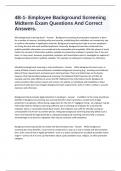4B-1- Employee Background Screening
Midterm Exam Questions And Correct
Answers.
Why background screening done? - Answer Background screening of prospective employees is done
for a number of reasons, including safety and security, establishing that candidates are trustworthy, and
to confirm information in application materials. Background screening also helps to ensure employers
are hiring the best and most qualified applicants. Generally, background searches conducted from
publicly available information are considered to be reasonable and acceptable. With the advent of social
media, the amount of information publicly available to prospective employers is greater than it has ever
been. In many cases, however, prospective employers will nevertheless want to investigate an applicant's
background beyond what is publicly available—for example, by calling prior employers or references.
Mandatory background screening in some professions - Answer While background screen occurs in
nearly all fields of work, some professions mandate background screening (e.g., teaching and childcare).
Many of these requirements are based upon state-level laws. There are federal laws on the books,
however, that help facilitate background screening. The National Child Protection Act of 1993, for
example, permits state officials to access the FBI's National Crime Information Center database for
certain positions that involve contact with minors, the elderly, or individuals with disabilities.1 Most
government jobs also have stringent background check requirements, both in order to obtain a security
clearance and otherwise.
Background check provides legal protection to employers - Answer In addition to the many amorphous
benefits of background screening, one concrete benefit is that it provides a certain level of legal
protection to employers. When facing a legal claim for the tort of "negligent hiring," an employer may be
held civilly liable for failing to exercising sufficient care in selecting an employee for a job that the
employer knew, or reasonably should have known, the employee was unfit for, thereby causing an
unreasonable risk of harm to another person. Adequate background screening may help defeat such a
claim. Even beyond the legal protections, adequate background screening may also help a company
avoid damage to its business reputation that may be caused by unfit employees.
Background screening should not violate anti-discrimination laws - Answer While background
screening has many benefits, it must also be conducted in a way so as not to violate anti-discrimination
laws. Even a search that is legally permitted—such as a search conducted on a publicly accessible search
engine—carries risk if it turns up information about a job candidate's race, religion, or other protected
category.
, Laws that affect background screening - Answer Beyond the basic prohibition against discrimination,
however, many of these laws affect how employee screening can be done. A good example is the
Americans With Disabilities Act's ("ADA") prohibition on medical testing during the pre-offer stage of
recruitment. As a general proposition, employers should avoid asking prospective employees and
applicants about whether they fall into any protected class. Human resource professionals often receive
extensive training about how to collect relevant information without running afoul of federal and state
anti-discrimination laws, as well as other best practices.
Restrictions Under the Fair Credit Reporting Act (FCRA) - Answer The most far-reaching law impacting
the hiring process for employers is the Fair Credit Reporting Act ("FCRA"), which was discussed at length
in Module II.C.2. As previously noted, the FCRA governs the use of "consumer reports," which are
defined to include information obtained from a consumer reporting agency ("CRA") related to, among
other things, a consumer's "character, general reputation, personal characteristics, or mode of living"
that is used for "employment purposes."Under this definition, a "consumer report" includes much more
than just credit information; it also can include things such as criminal history, driving records, and a host
of other information.
The FCRA prohibits anyone from obtaining a "consumer report" or "investigative consumer report"
unless they have a "permissible purpose," which includes "employment purposes." An employment
purpose includes hiring, promotion, reassignment, or retention of an employee.
As noted previously, unlike in most other situations, there are significant additional requirements under
the FCRA when a consumer report is obtained for an employment purpose. Prior to providing a
consumer report for an employment purpose, a CRA must obtain a certification from the user of the
consumer report that: (1) they have been given written permission from the consumer to obtain a
consumer report; (2) that they will comply with all statutory requirements if an adverse determination is
made based upon information in the consumer report; and (3) that the consumer report will not be used
in violation of equal employment opportunity laws. A user of a consumer report for employment
purposes must also make significant additional disclosures to the consumer before a consumer report is
obtained.8 Likewise, additional requirements exist under the FCRA when adverse action is taken based
upon
Methods of Pre-Employment Screening - Answer As we noted in the introductory Module of this study
guide, the laws and regulations protecting privacy could be thought of as protecting the four categories
of information privacy, bodily privacy, communication privacy, and territorial privacy. The methods of
pre-employment background screening take many forms. Laws have therefore arisen that protect each
of these interests—both in the pre-employment context and after an employee has been hired. For
example, restrictions on polygraph testing and drug testing protect employee's and applicant's bodily
privacy, while restrictions on lifestyle discrimination could be thought of as protecting information




